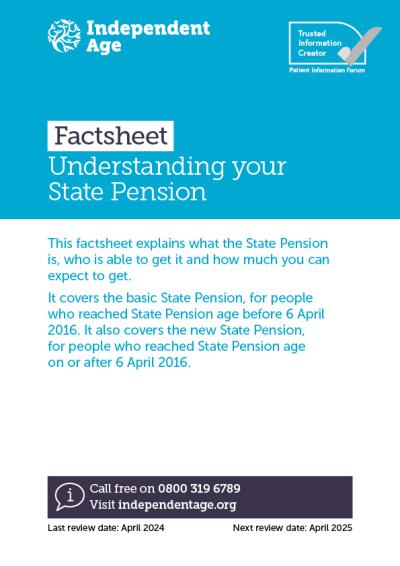Related publications

Moneywise

You don’t have to retire when you reach State Pension age and there are many advantages to working in later life. As well as topping up your income, working may also help to keep you mentally, physically and socially active. There are benefits for your employer too.
For many people, money is a major reason for working past State Pension age, but it’s not the only motivation. If you’re still fit, enjoy your role and want to keep working, there may be other benefits for your wellbeing, including:
• mental stimulation
• a structure to your days
• social contact and friendship
• status and identity
• a sense of purpose.
Employers also benefit from having older employees, who can bring a wider range of experience to their workforce and pass on skills to younger workers.
It’s up to you when you claim your State Pension. Once you reach State Pension age, you have three options. You could:
• stop working and claim your State Pension
• continue to work and claim your State Pension as well
• carry on working and delay claiming your State Pension.
If you decide to delay claiming your State Pension, you may get more money for every year you defer. If you defer your State Pension for less than nine weeks, you won’t receive any extra money.
You don’t need to do anything to defer your State Pension, as it will automatically be deferred until you claim it.
Deferring a private pension may not be so beneficial. You should get independent financial advice before making any decisions about what to do with your pension pot if you have one. You can find an adviser through the Society of Later Life Advisers.
MoneyHelper’s Pension Wise service has more information about your options if you have a UK-based defined contribution pension (personal or workplace).
If you have a workplace pension, you’ll need to speak to your employer to find out if you can delay taking it and how this might affect what you get.
Working can also affect your entitlement to means-tested benefits, such as Pension Credit, because the amount of income you get from working may affect whether you qualify. Deferring your State Pension can also affect how much you can receive in benefits. Call our free Helpline on 0800 319 6789 to arrange to speak to an adviser if you need more information.
You may have to pay Income Tax depending on how much you earn. Your tax position could be complicated if you’re receiving income from more than one pension as well. The charity Tax Help for Older People has a free advice service for people on low incomes.
You don’t have to pay National Insurance contributions any more once you reach State Pension age. However, if you’re self-employed, you may choose to make Class 2 contributions and you may have to pay Class 4 contributions depending on your profits. You can find more information on Gov.uk.
There’s no official retirement age and you can’t be forced to retire, except in some jobs such as the fire service. If you decide to stay on, there are benefits to your employer. They’ll save on recruitment and induction costs and many employers value the skills, experience and reliability of older workers.
If you don’t want to work full time, you could discuss a phased retirement plan with your employer and consider flexible working. This would allow you to organise your hours to suit you – for example, to fit in around caring responsibilities or to give you time for other things.
Flexible working includes:
• working part time – you should have the same rights as a full-time employee
• job sharing – you share your job with a colleague and split the hours between you
• compressed hours – working the same hours but over fewer days
• working from home.
You might also want to consider self-employment. You’ll need to register as self-employed with HMRC, complete self-assessment tax returns, and you may have to pay tax and National Insurance contributions.
If you’re thinking of setting up your own business, you could get help from the National Enterprise Network. Its members offer advice, support and training about starting or developing a small business. Some government-backed schemes also offer support.
If you’ve been out of work for some time, you might need some help to get back to work. You can contact the National Careers Service to get careers advice or use their online tools, such as the skills health check.
If you’re unemployed and looking for work, your local Jobcentre Plus may also provide support, such as CV advice and help with interview preparation, and you could also join a work club.
If you’re worried that you don’t have the right skills, or you’re thinking of changing careers, you may want to take a course.
Apprenticeships combine practical training in a job with study and there is no upper age limit, although the funding rules are different for adult apprenticeships. You can search for an apprenticeship.
If money isn’t a concern, you could also consider volunteering to gain more skills and experience. Contact NCVO to find opportunities. Many charities also welcome volunteers, including Independent Age.
There are various ways of finding vacancies. Using the internet can be very effective but make sure you protect your privacy if you post your details online.
If you don’t have access to the internet or a computer at home, many local libraries offer free internet access. You may need to book a slot. If you live in England or Wales, search for your local library on Gov.uk. If you live in Scotland, go to mygov.scot.
You could try:
You could also try approaching an employer directly. Some vacancies are not advertised and it can’t hurt to show an interest in their work.
Employers may not respond unless they want to invite you to an interview, which can be disheartening. If you start to lose confidence, it might be a good idea to get advice to make sure your CV and cover letter are working for you. Get in touch with the National Careers Service and arrange to speak to an adviser.
When you apply for jobs, you don’t have to say how old you are and employers are not allowed to discriminate on the grounds of age.

You can find your local Jobcentre Plus at Gov.uk.
For careers advice, contact the National Careers Service.